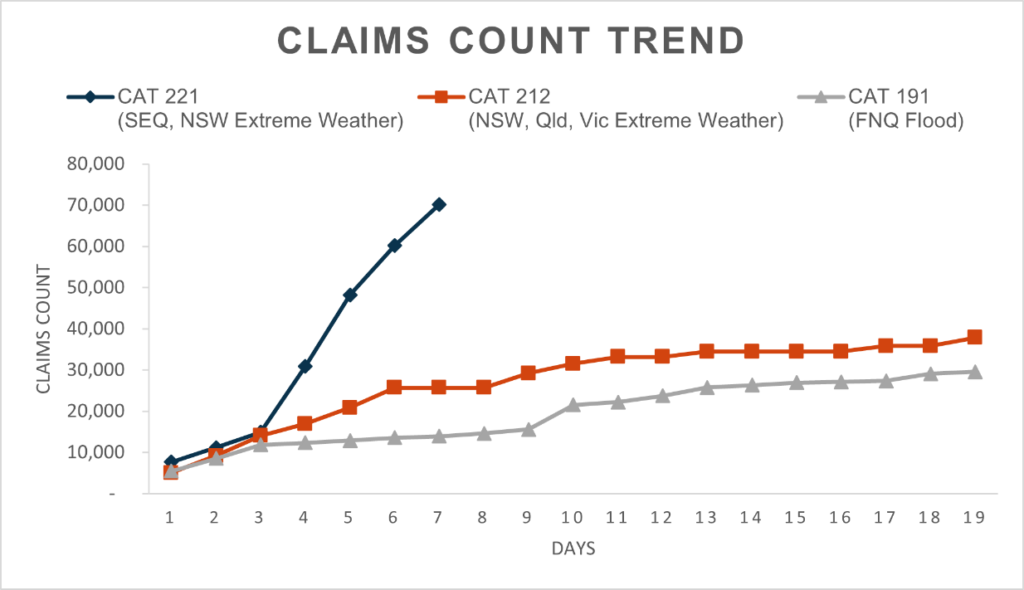Friday, 4 March 2022
The Insurance Council of Australia (ICA) today said insurers have received 67,537 claims related to the ongoing flooding in South-East Queensland and New South Wales.
This is a 12 per cent increase on yesterday’s claims count, indicating that the rate at which claims are coming in is slowing. (See graph below)
Seventy-six per cent of these claims are from Queensland and 24 per cent are from New South Wales. New South Wales figures are still expected to increase in coming days as the impacts of the weather event become more apparent.
Eighty-two per cent of claims are for domestic property, with the remainder motor vehicle.
Based on previous flood events the estimated current cost of claims is now just over $1 billion.
This figure is subject to detailed assessment of claims as loss adjustors move in over the coming weeks and will increase as further claims are made.
ICA CEO Andrew Hall today welcomed comments by National Recovery and Resilience Agency (NRRA) head, Shane Stone, calling for a review of land use planning arrangements.
Mr Hall is in Canberra today to attend a meeting of emergency service ministers and agencies along with other stakeholders.
Quote attributable to Andrew Hall, CEO, Insurance Council of Australia:
The impacts of this event across two States are still coming into focus, and we are particularly concerned about the community of Lismore who have been absolutely devastated.
An army of insurance assessors are already on-the-ground helping with claims where it is safe to do so, and we are working closely with all levels of government and community to see this happen as quickly as possible.
Claims handling reforms have significantly improved the customer experience, and eligible customers in urgent need can now more quickly receive an advance cash payment of up to $5,000.
Customers may also be able to access temporary accommodation under their policy, although I acknowledge that this is particularly tight in Lismore and some other locations.
This event has just reinforced the need for a national conversation about what we build and where we build it, and to that end I welcome comments by NRRA head Shane Stone today and look forward to taking up this issue with State and Federal Governments in coming months.

Remember
- Safety is the priority – don’t do anything that puts anyone at risk
- Only return to your property when emergency services give the go ahead
- If water has entered the property, don't turn on your electricity until it has been inspected by an electrician
- Contact your insurance company as soon as possible to lodge a claim and seek guidance on the claims process
- Property owners who have sustained roof damage should advise their insurer, your insurer will arrange emergency works to minimise any hazards and prevent further damage. This can include isolating damaged solar panels or electrical circuits and installing a roof tarp
- Don’t worry if you can’t find your insurance papers – insurers have electronic records and need only your name and address
What to do if your property has been impacted by flooding and storms
- You can start cleaning up but first take pictures or videos of damage to the property and possessions as evidence for your claim
- Keep samples of materials and fabrics to show your insurance assessor
- Remove water damaged goods from your property that might pose a health risk, such as saturated carpets and soft furnishings
- Make a list of each item damaged and include a detailed description, such as brand, model, and serial number if possible
- If water has entered the property, do not turn on your electricity until it has been inspected by an electrician
- Store damaged or destroyed items somewhere safe where they do not pose a health risk
- Speak to your insurer before you attempt or authorise any building work, including emergency repairs, and ask for the insurer’s permission in writing. Unauthorised work may not be covered by your policy
- Do not throw away goods that could be salvaged or repaired











